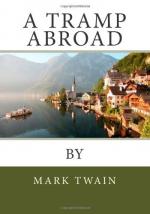We were in a bleak, unsheltered place, now, and had to trudge right along, in order to keep warm, though we rather expected to go over a precipice, sooner or later. About nine o’clock we made an important discovery —that we were not in any path. We groped around a while on our hands and knees, but we could not find it; so we sat down in the mud and the wet scant grass to wait.
We were terrified into this by being suddenly confronted with a vast body which showed itself vaguely for an instant and in the next instant was smothered in the fog again. It was really the hotel we were after, monstrously magnified by the fog, but we took it for the face of a precipice, and decided not to try to claw up it.
We sat there an hour, with chattering teeth and quivering bodies, and quarreled over all sorts of trifles, but gave most of our attention to abusing each other for the stupidity of deserting the railway-track. We sat with our backs to the precipice, because what little wind there was came from that quarter. At some time or other the fog thinned a little; we did not know when, for we were facing the empty universe and the thinness could not show; but at last Harris happened to look around, and there stood a huge, dim, spectral hotel where the precipice had been. One could faintly discern the windows and chimneys, and a dull blur of lights. Our first emotion was deep, unutterable gratitude, our next was a foolish rage, born of the suspicion that possibly the hotel had been visible three-quarters of an hour while we sat there in those cold puddles quarreling.
Yes, it was the Rigi-Kulm hotel—the one that occupies the extreme summit, and whose remote little sparkle of lights we had often seen glinting high aloft among the stars from our balcony away down yonder in Lucerne. The crusty portier and the crusty clerks gave us the surly reception which their kind deal out in prosperous times, but by mollifying them with an extra display of obsequiousness and servility we finally got them to show us to the room which our boy had engaged for us.
We got into some dry clothing, and while our supper was preparing we loafed forsakenly through a couple of vast cavernous drawing-rooms, one of which had a stove in it. This stove was in a corner, and densely walled around with people. We could not get near the fire, so we moved at large in the artic spaces, among a multitude of people who sat silent, smileless, forlorn, and shivering—thinking what fools they were to come, perhaps. There were some Americans and some Germans, but one could see that the great majority were English.
We lounged into an apartment where there was a great crowd, to see what was going on. It was a memento-magazine. The tourists were eagerly buying all sorts and styles of paper-cutters, marked “Souvenir of the Rigi,” with handles made of the little curved horn of the ostensible chamois; there were all manner of wooden goblets and such things, similarly marked. I was going to buy a paper-cutter, but I believed I could remember the cold comfort of the Rigi-Kulm without it, so I smothered the impulse.




